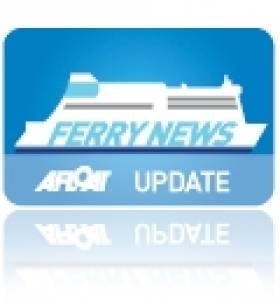Displaying items by tag: P&O (Iirsh Sea)
Enter European Endeavour
The European Endeavour will enable P&O to offer up to three Ro-Pax style sailings a day on the 7.5 hour route instead of the previous two-plus one Ro-Ro (freight-only operated) service. The 180m vessel is no newcomer on the route as over the last two years the ship has deputised to cover the annual overhauls of the routes' vessels.
The Spanish built vessel directly replaced the Ro-Ro freight ferry Norcape, which made her final sailing on the central corridor route, with the 1979 built vessel berthing at Liverpool's Huskisson Dock in the early hours of Sunday morning. Norcape could take 125 drop trailers but only had 12-passengers cabins (for freight accompanied truck-drivers).
Only last year the Japanese built vessel returned to the Irish Sea route as the Norcape but originally started a career with the B+I Line as their Tipperary on the Dublin –Fleetwood route. The UK port was switched to Liverpool in 1988, in the following year she was sold to North Sea Ferries.
The standing down of the Norcape represents the last vessel of the former B+I Line fleet to have any association with the Irish Sea. In 1991 the Irish state owned shipping company was sold to Irish Continental Group (ICG) which is a parent company of Irish Ferries. At that stage Irish Ferries operated only on the continental routes to France.
To read more about Norcape's final sailing on the Irish Sea route, click here.





























































